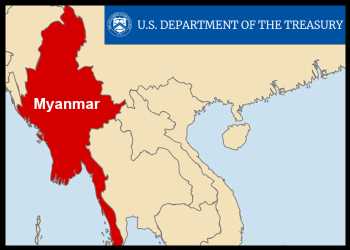US Imposes Sanctions On Myanmar's Ministry Of Defense
The United States has imposed sanctions on Myanmar’s Ministry of Defense over the military regime’s brutal tactics to consolidate power and repress its people.
Department of the Treasury’s Office of Foreign Assets Control (OFAC) has also designated two financial institutions controlled by the military regime.
Myanma Foreign Trade Bank (MFTB) and Myanma Investment and Commercial Bank facilitate much of the foreign currency exchange within the country and enable transactions between the military regime and foreign markets, including for the purchase and import of arms and related materiel.
Following the military coup in 2021, Myanmar’s military has destroyed villages, schools, and medical facilities by launching aerial attacks.
More than 3,600 civilians were killed, tens of thousands of homes and other infrastructure destroyed, and nearly 1.5 million people were displaced as a result of the military’s violence, according to the US Treasury.
“Burma’s military regime has leveraged state-run access to international markets to import weapons and materiel, including from sanctioned Russian entities, to continue its violence and oppression,” said Under Secretary of the Treasury for Terrorism and Financial Intelligence Brian E. Nelson. “We will continue to support the people of Burma and deny the regime access to the means to perpetuate ongoing atrocities,” he added.
The Treasury said that since the coup, the Myanmar Defense Ministry has imported goods and materiel worth at least $1 billion, including from U.S.-sanctioned Russian firms.
Myanma Foreign Trade Bank and Myanma Investment and Commercial Bank are state-owned financial institutions that function as foreign currency exchanges and enable the conversion of Myanmar’s national currency kyat to U.S. dollars and euros and vice versa. This conversion allows the country’s revenue-generating state-owned enterprises, including Myanma Oil and Gas Enterprise (MOGE), access to international markets using offshore accounts and to transact more easily with foreign entities, according to the U.S. Treasury Department.
Source: Read Full Article

